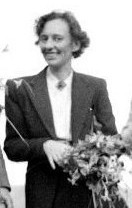 It’s always easy to tear a translation apart, and the easiest kind of translation to tear apart is poetry. Vladimir Nabokov, who lived multilingually and thought a lot about translation, was one of the best, and funniest, critics of other people’s renditions of Russian classics into English—as can be seen now in his ”Art of Translation”, a article from 1941 available on The New Republic’s website.
It’s always easy to tear a translation apart, and the easiest kind of translation to tear apart is poetry. Vladimir Nabokov, who lived multilingually and thought a lot about translation, was one of the best, and funniest, critics of other people’s renditions of Russian classics into English—as can be seen now in his ”Art of Translation”, a article from 1941 available on The New Republic’s website.
But Nabokov’s translation of Pushkin, which he mentions working on in this piece, didn’t come off so well, because he got overly concerned about following rules he set for himself. Any translation of a poem has to give up on entire swathes of what makes the verse intriguing and worth reading in the original, but it can’t work on any level if it doesn’t stand as a poem on its own terms. But to do that, as Nabokov notes, the translator needs to see the world, as best he can, through the poet’s eyes.
A mistake of that sort came up in an evening on the classic Israeli poet Leah Goldberg that I attended last week.





